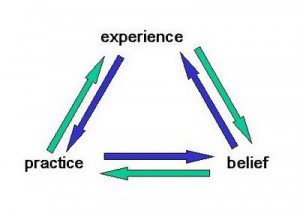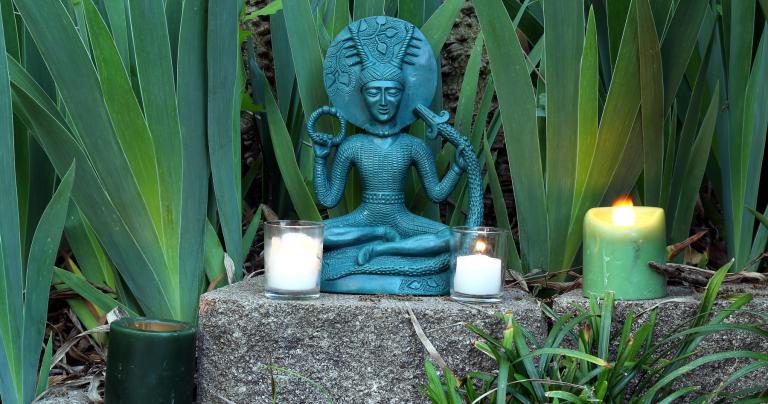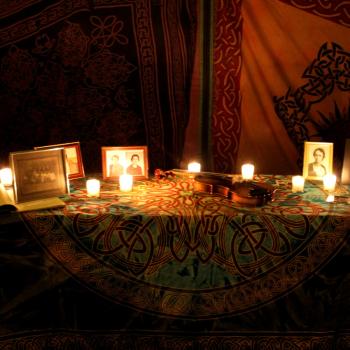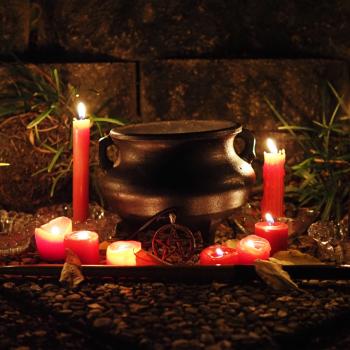Sam Gallagher asked a question that required an answer too long for last week’s Conversations Under the Oaks.
I am a life-long non-religious person. I find the Pagan path to be the most appealing of any faith I have encountered, but I still feel somewhat baffled about one aspect of any religion: belief.
Simply put, placing unconditional faith into any particular theological framework feels completely foreign to me. I know that scholars tell us that ancient Paganism was far more orthopraxic than orthodoxic, but I feel like I’m missing out on an important part of spiritual practice if I can’t comprehend how to wholeheartedly believe. Is unconditional belief required in a Pagan framework? What am I missing?
The short answer is that you’re not missing anything. Unconditional belief not only isn’t required, it isn’t advised. While there is a place for belief in Paganism, the beliefs we have should be held loosely.
But many people feel like unconditional and unsubstantiated belief is a necessary part of “real” religion. And that’s worth exploring in more detail.
The Protestant emphasis on belief
Any discussion of religious belief must begin with the emphasis placed on it in Protestant Christianity, the dominant religious approach in the Anglo-American world. While all religions have an element of belief – even if it’s only the belief that its practices are a good and proper expression of its tradition – no other religious tradition elevates belief to the level Protestantism does.
Try as I might, I can never forget two verses from the New Testament that were pounded into my head as a small child: “For by grace are ye saved through faith; and that not of yourselves: it is the gift of God: Not of works, lest any man should boast.” (Ephesians 2:8-9, KJV). As I think about it now, it was always the faith part that was emphasized, not the grace. Not “here is God’s gift” but “you must believe.” And also, “if you believe, what you do doesn’t really matter.”
Which emphasis is correct or more correct is a matter I leave for Christians to decide. For Pagans – and pretty much everyone else – what you believe matters far less than what you do. Yes, it’s good to “believe in” the Gods – to believe They exist, and that They are (among many other things) the personification of Their virtues. But it’s better to honor Them and to embody Their virtues in our daily lives.
Belief as unreflective acceptance of unsubstantiated assertions
Another verse I can’t not remember says “Now faith is the substance of things hoped for, the evidence of things not seen.” (Hebrews 11:1, KJV). That’s not a bad definition. It’s a far better than the working definition most people – Christian or otherwise – use: “what I’ve always been told is true and never really gave much thought.”
Why should you believe something? Because some authority figure says so? Because it’s in some book that was written 2500 years ago for a specific group of people in a specific place and time… and then translated into English by people with ideas of their own? Or even because “that’s the way we’ve always done it”?
I’m a Pagan polytheist who practices magic – I believe a lot of things that don’t have enough evidence to convince skeptics. But I refused to accept beliefs that didn’t make sense to me when I was told the fate of my soul depended on it. I’m certainly not going to mindlessly and unconditionally accept things now just because someone tells me it’s true.
On the other hand, I’m not going to refuse to believe something just because a different set of authority figures and books say it’s not possible.
Belief that comes from experience
Two years ago I saw a green glowing bird. There is no question what I saw – the question is how to interpret it. I ran through the mundane options and none of them fit. Then I ran through the non-ordinary options and came to the conclusion that the Otherworld is bleeding through into this world. I can’t prove that to my satisfaction, much less to the satisfaction of an atheist. But based on my experience – both here and elsewhere – I’m convinced that believing this is a reasonable and helpful thing to do.
Cherish your religious and magical experiences. Examine them with rational thought and with intuitive meditation. Listen to the opinions of experienced practitioners, but then make up your own mind. Unreflective acceptance of unsubstantiated assertions is never a good thing.
From believing to knowing
Not everyone who says “I want to believe” is under the influence of Protestant domination or is looking for some authority figure to do their work for them. I regularly hear from Pagans who like the idea of living in a magical universe and of having relationships with some of the many Gods, but who have trouble accepting that such things are possible.
You don’t have to believe. You just have to do.
The best way to believe in magic is to work magic. Do the spells – and do them right, intent alone isn’t enough – and you’ll get results. Maybe the first time is a coincidence. Maybe the second time is random chance. But by the fifth or sixth or tenth time, it’s easier to accept that the magic works. Now you believe in magic.
After you’ve worked magic for a few years, after you’ve had success after success after success – and after you’ve had your share of failures, and investigated them to figure out why you failed – belief doesn’t do it justice anymore. Now you know that magic is real. Oh, you still can’t convince your skeptical friends – they’re operating under a materialist worldview. You’ve moved on to a magical worldview. But your goal never was to win arguments with atheists – it was to have a deep and fulfilling life.
Knowing the Gods are real
It works the same way with the Gods. You don’t have to believe in the Gods – you just have to honor them. Set up a shrine, pray, make offerings, and meditate. Read Their stories and sing Their songs – learn to embody Their virtues.
The Gods are sovereign, autonomous persons. They cannot be commanded, so unlike with magic, there’s no guarantee that doing the right things will bring the results you want. But They are virtuous persons who (for the most part) embody hospitality and reciprocity. If you show interest in Them, They are likely to show interest in you.
It may take some time for you to get the attention of a particular deity. But also, it may take some time for Them to get your attention. My relationship with Cernunnos goes back to all the time I spent in the woods as a kid. But it took five years from the time I got serious about my Pagan practice until I had my first ecstatic experience of Him. It took three more years before I had my second.
Was I not working hard enough or fast enough? Or was I simply otherwise occupied? That was the time when I was working through the OBOD training, and part of it was when my paying job got really stressful. I think I had my hands full. Or maybe Cernunnos didn’t need that from me at the time. I don’t know.
But I do know that through eight years, I believed in the Gods. After that second ecstatic experience, my communion with Him became more frequent. And then I began to have first-hand experiences of the Morrigan with regularity, and with Danu, Lugh, Brighid, and some of the Gods of Egypt.
I can’t tell you exactly when it happened, but at some point I shifted from believing in the Gods to knowing the Gods.
Practice – Experience – Belief
 Belief, practice, and experience form a virtuous circle. As I discussed last week, the circle can go in either direction, and you can enter from any point. But most people will be best served by beginning with practice. Do the right things. Experiences will come from your practices – some may be dramatic, but most will be subtle. Then form beliefs as you interpret your experiences and put them into context.
Belief, practice, and experience form a virtuous circle. As I discussed last week, the circle can go in either direction, and you can enter from any point. But most people will be best served by beginning with practice. Do the right things. Experiences will come from your practices – some may be dramatic, but most will be subtle. Then form beliefs as you interpret your experiences and put them into context.
Then do it again, and again, and again. Keep practicing. Keep doing the things that bring magical results or that facilitate the presence of the Gods. Figure out what it means. Over and over and over again.
So no, unconditional belief is absolutely not required in our Pagan traditions. If you feel you have to believe unconditionally, ask yourself why, and make sure it’s not the influence of the majority religion.
But if you simply want to believe, begin with practice. Let belief come in its own time.




















